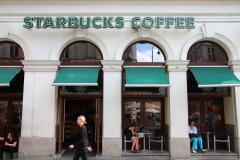
Starbucks is everywhere!
While that cry become a rampant cliché in American pop culture, and fodder for many a late-night talk show monologue, Starbucks (NASDAQ: SBUX) often seems to be on virtually every corner of every street in metropolitan America. While exaggerated, that claim can certainly feels true sometimes -- especially when driving through most major cities.
In more realistic terms, the franchise has more than made its presence known in the United States.
There are very few incorporated cities and towns in this country that don’t have at least one Starbucks outlet. That being the case, it would seem that Starbucks has a veritable monopoly on the gourmet coffee market.
But there this other outfit called Dunkin Brands (NASDAQ: DNKN), parent company of the 50-year-old Dunkin’ Donuts coffee chain, that is giving Starbucks a run for its competitive money.
So which stock would you rather invest in, Starbucks or Dunkin’ Brands?
Starbucks made a niche in the gourmet coffee market by charging upwards of $6.00 for a cup, and making it fashionable to pay such an outrageous amount. You would think such a high mark-up would be economic suicide for a company -- but it has actually behooved the company to do so.
Related: Dollar Tree vs. Family Dollar: Which is the Better Bet?
Over the course of the last three years the per-share value of Starbucks has seen a three-fold increase to about $75. Their model has influenced the establishment of countless local and regional coffee stores, and has even indirectly played a part in making its now-biggest competitor Dunkin’ Brands the player that it has become.
As a relatively new, publicly-traded company, Dunkin’ Brands and its flagship entity Dunkin’ Donuts has upped the ante in the market.
Dunkin’s strategy has been manifold -- but one of the key elements has been to basically copycat Starbucks in their choice of locations. Almost anywhere that you find a Starbucks you will find a Dunkin’ Donuts within a few blocks. And while Starbucks is far and away the leader in terms of the overall numbers of outlets, Dunkin’ is making some serious headway in that department.
Starbucks enjoys a market cap of $53 billion versus the comparatively tiny cap of $5 billion for Dunkin’, but Dunkin’ has demonstrated a level of innovation and consumer attraction that Starbucks simply does not have. Dunkin’ stores are becoming every bit as contemporary and inviting as Starbucks, and customer feedback indicates the donuts offered by Dunkin’ are far superior to Starbucks' pastry offerings, which could mean the difference over the next three to five years.
Dunkin’s earnings-per-share skyrocketed nearly 25 percent in the second quarter of 2013 from a year prior, which dwarfed that of Starbucks -- and revenue was up fully six percent for Dunkin’.
With Starbucks as the clear market leader for the time being, it may seem like a classic case of David versus Goliath. But David is growing exponentially with each passing quarter.
So, which is the better stock investment? The short-term seems to favor Starbucks, but the long-term may be giving the nod to Dunkin’. In the end, it is for the savvy investor to make the call.
Loading...
Posted-In: cafes coffee food and beverage retailCommodities Restaurants Markets General Best of Benzinga
(c) 2014 Benzinga.com. Benzinga does not provide investment advice. All rights reserved.
Most Popular Five Star Stock Watch: Facebook, Round Two A Look at Some 'Legit' OTC Stocks 5 Technology Stocks With The Highest EPS Estimates The Herd Continues to Flock Out of Icahn Enterprises Berkshire Hathaway To Trade Stock for Phillips 66 Specialty Products Business Which Is The Better Bet - FedEx vs. UPS? Related Articles (SBUX + DNKN) Starbucks vs. Dunkin' Donuts: Which Is The Better Bet? Some Big Companies Take Advantage Of Christmas Day Shopping Market Wrap For December 17: Markets Relatively Calm Before The Potential Storm Market Wrap For December 16: Dow Posts Triple Point Gain Ahead of Fed Meeting Benzinga's Top Downgrades Four Profitable Ways to Play the Retail Sector Around the Web, We're Loving... Lightspeed Trading Presents: Thunder and Tubleweeds: Trading Techniques for the New Market Enviroment Pope Francis Rips 'Trickle-Down' Economics Come See How the Pro's Trade in this Exclusive Webinar Wynn, MGM, Other Casino Giants Vying For U.S. Turf What Should You Know About AMZN? View the discussion thread. adsonar_placementId=1587471;adsonar_pid=313476 "Taking full advantage of the rights and privileges Americans enjoy — including our unique and often complicated financial systems — requires becoming financially naturalized as well," Blayney (left) said in a statement on Tuesday announcing the program. "It's important for all Americans — including new Americans — to obtain credit in their name, establish a credit history and build their savings."
"Taking full advantage of the rights and privileges Americans enjoy — including our unique and often complicated financial systems — requires becoming financially naturalized as well," Blayney (left) said in a statement on Tuesday announcing the program. "It's important for all Americans — including new Americans — to obtain credit in their name, establish a credit history and build their savings."
 Getty Images
Getty Images  Agence France-Presse/Getty Images
Agence France-Presse/Getty Images  Alamy Shares of an initial public offering in a hot company are practically the holy grail for most investors. The opportunity to get into a stock on the ground floor before the general public has an opportunity to buy in can be a fast way to make a profit. Unfortunately, IPO shares are usually allotted only to large investment firms or their select high-net-worth clients. There is, however, a way in which you can still ride the wave of a highly anticipated IPO in order to make some money. When it comes to investing, much of Wall Street has a herd mentality. Just as different TV networks look to the most popular shows on rival networks, then try to produce more shows in the hot genres, investment managers who see a company doing well will look for other companies in that sector to invest in. For example, if Facebook is hot, investment money will flow into other social media companies like Twitter or LinkedIn, and in the process drive all their share prices higher. This effect isn't limited to public companies; it also exists between companies in the same sector, even if some are public and others are private. A strategy that takes advantage of this can often give you an edge in your investing. Take for instance HomeAway, which trades under the ticker symbol AWAY. HomeAway connects landlords and renters, helping to facilitate short-term vacation rentals in the United States and internationally. Fundamentally, it's a sound company riding a growing tech trend, with rising EPS and revenue estimates, as well as a history of beating analysts' expectations. These factors alone would make it a worthy candidate to consider investing in, but if you dig a little bit more, you'll find another potential ace-in-the-hole. That ace is called Airbnb. Airbnb is the premier company in the online rental game -- the same sector that HomeAway occupies -- but it's a private company. You can't invest in it yet. However, it's expected that Airbnb will launch an IPO late in 2014, with a valuation of over $10 billion. Here's where that herd mentality comes into play. As investors' attention is drawn to a hot IPO, capital tends to flow to its publicly traded competitors; in essence, they become a proxy for the better private company. So even though Airbnb may be the better of these two companies, HomeAway's stock should still go up as anticipation of Airbnb's IPO rises. Of course, there are no guarantees, and what happens in the overall market will probably play a bigger role in HomeAway's share performance than the Airbnb IPO. But now that you know how this symbiotic relationship works, you can use it find other examples -- and profit from them as well.
Alamy Shares of an initial public offering in a hot company are practically the holy grail for most investors. The opportunity to get into a stock on the ground floor before the general public has an opportunity to buy in can be a fast way to make a profit. Unfortunately, IPO shares are usually allotted only to large investment firms or their select high-net-worth clients. There is, however, a way in which you can still ride the wave of a highly anticipated IPO in order to make some money. When it comes to investing, much of Wall Street has a herd mentality. Just as different TV networks look to the most popular shows on rival networks, then try to produce more shows in the hot genres, investment managers who see a company doing well will look for other companies in that sector to invest in. For example, if Facebook is hot, investment money will flow into other social media companies like Twitter or LinkedIn, and in the process drive all their share prices higher. This effect isn't limited to public companies; it also exists between companies in the same sector, even if some are public and others are private. A strategy that takes advantage of this can often give you an edge in your investing. Take for instance HomeAway, which trades under the ticker symbol AWAY. HomeAway connects landlords and renters, helping to facilitate short-term vacation rentals in the United States and internationally. Fundamentally, it's a sound company riding a growing tech trend, with rising EPS and revenue estimates, as well as a history of beating analysts' expectations. These factors alone would make it a worthy candidate to consider investing in, but if you dig a little bit more, you'll find another potential ace-in-the-hole. That ace is called Airbnb. Airbnb is the premier company in the online rental game -- the same sector that HomeAway occupies -- but it's a private company. You can't invest in it yet. However, it's expected that Airbnb will launch an IPO late in 2014, with a valuation of over $10 billion. Here's where that herd mentality comes into play. As investors' attention is drawn to a hot IPO, capital tends to flow to its publicly traded competitors; in essence, they become a proxy for the better private company. So even though Airbnb may be the better of these two companies, HomeAway's stock should still go up as anticipation of Airbnb's IPO rises. Of course, there are no guarantees, and what happens in the overall market will probably play a bigger role in HomeAway's share performance than the Airbnb IPO. But now that you know how this symbiotic relationship works, you can use it find other examples -- and profit from them as well. "Je Suis Charlie" merchandise a booming cottage industry NEW YORK (CNNMoney) In the days since the horrific attack in Paris on Charlie Hebdo, signs of support are everywhere: "Je Suis Charlie" can be found on leather key rings, decals, bumper stickers, mugs, and of course, t-shirts.
"Je Suis Charlie" merchandise a booming cottage industry NEW YORK (CNNMoney) In the days since the horrific attack in Paris on Charlie Hebdo, signs of support are everywhere: "Je Suis Charlie" can be found on leather key rings, decals, bumper stickers, mugs, and of course, t-shirts.  For those who may not know, each month we host a joint web chat for subscribers of The Energy Strategist (TES) and MLP Profits. The chat is conducted by Igor Greenwald, managing editor for TES and chief investment strategist for MLP Profits, and myself.
For those who may not know, each month we host a joint web chat for subscribers of The Energy Strategist (TES) and MLP Profits. The chat is conducted by Igor Greenwald, managing editor for TES and chief investment strategist for MLP Profits, and myself.